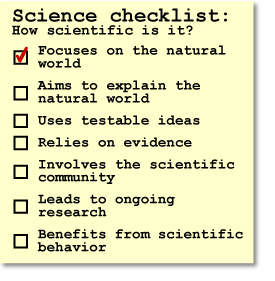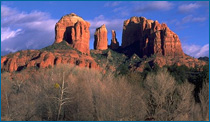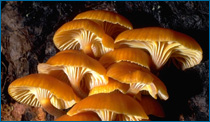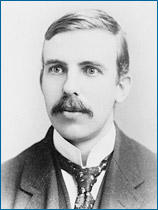So what, exactly, is science? Well, science turns out to be difficult to define precisely. (Philosophers have been arguing about it for decades!) The problem is that the term "science" applies to a remarkably broad set of human endeavors, from developing lasers, to analyzing the factors that affect human decision-making.
To get a grasp on what science is, we'll look at a checklist that summarizes key characteristics of science and compare it to a prototypical case of science in action: Ernest Rutherford's investigation into the structure of the atom. Then, we'll look at some other cases that are less "typical" examples of science to see how they measure up and what characteristics they share.
This checklist provides a guide for what sorts of activities are encompassed by science, but since the boundaries of science are not clearly defined, the list should not be interpreted as all-or-nothing. Some of these characteristics are particularly important to science (e.g., all of science must ultimately rely on evidence), but others are less central. For example, some perfectly scientific investigations may run into a dead end and not lead to ongoing research. Use this checklist as a reminder of the usual features of science. If something doesn't meet most of these characteristics, it shouldn't be treated as science.

Science asks questions about the natural world
Science studies the natural world. This includes the components of the physical universe around us like atoms, plants, ecosystems, people, societies and galaxies, as well as the natural forces at work on those things. In contrast, science cannot study supernatural forces and explanations. For example, the idea that a supernatural afterlife exists is not a part of science since this afterlife operates outside the rules that govern the natural world.




Anything in the natural world - from exotic ecosystems to urban smog - can be the subject of scientific inquiry.
Science can investigate all sorts of questions:
- When did the oldest rocks on earth form?
- Through what chemical reactions do fungi get energy from the nutrients they absorb?
- What causes Jupiter's red spot?
- How does smog move through the atmosphere?
Very few questions are off-limits in science - but the sorts of answers science can provide are limited. Science can only answer in terms of natural phenomena and natural processes. When we ask ourselves questions like, What is the meaning of life? and Does the soul exist? we generally expect answers that are outside of the natural world - and hence, outside of science.

A SCIENCE PROTOTYPE: RUTHERFORD AND THE ATOM

In the early 1900s, Ernest Rutherford studied (among other things) the organization of the atom - the fundamental particle of the natural world. Though atoms cannot be seen with the naked eye, they can be studied with the tools of science since they are part of the natural world.
Rutherford's story continues as we examine each item on the Science Checklist. To find out how this investigation measures up against the rest of the checklist, read on.